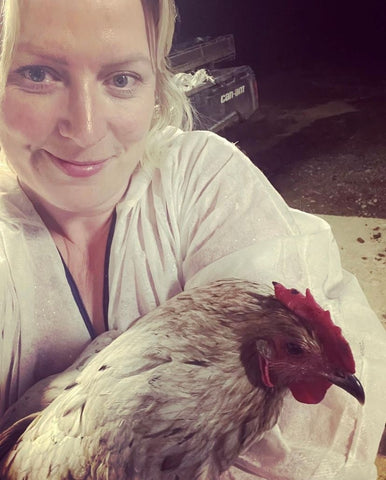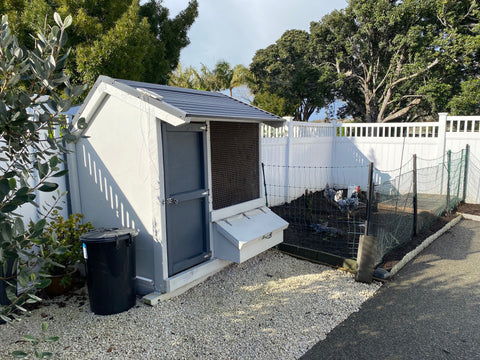Being more self-sufficient is something that many people today are trying to achieve. The rising costs of fresh fruit and vegetables, coupled with the egg shortage that New Zealand continues to face, is leading many people to consider other options.
This month, we talk to veterinarian and farmer Sally Newall about sustainable living. The mum of three is based in Patoka, rural Hawke’s Bay, where she and husband Nathan own and manage a commercial bull beef farm, alongside breeding every animal in the Old McDonald’s farm storybook, including raising calves, lambs, and taking in rescue chickens! She also runs a successful Facebook and Instagram page ‘Kiwi Country Kids’ where she shares exactly what it’s like to be a farming family, in this day and age.

Pictured: Sally Newall
How did you get into farming?
I am a UK-trained vet and grew up on our family farm in North Yorkshire. Our farm was mainly arable but mum has always been a keen breeder of various animals, including race horses, chickens and even peacocks, so working with the land and breeding animals is in the blood!
What is the philosophy of your farm?
We are all about the importance of high welfare, sustainable farming. I’m really passionate about caring for every animal on our farm to the very best of our ability. We also put a lot of time and effort into improving biodiversity, planting hundreds of natives every winter and using best practice techniques to minimise our impact on the environment.
Our children are involved with life on the farm every day, feeding the animals, helping with yard work, moving bulls to new paddocks, they love it! We teach our children to be compassionate and respectful towards animals, they develop lots of animal husbandry and practical outdoor skills and they certainly know where their food comes from.
We farm bull beef commercially, with around 1000 bulls spread across two farms, totaling 500 hectares. My passion is breeding high quality healthy animals, so I have a small flock of 20 coloured ewes, 6 beef cows, a few Saddleback pigs and our own chooks. We sell calves, lambs, piglets, chickens and eggs to friends and neighbours and I am starting to dabble in added value products, such as tanning our beautiful coloured lambskins when we process lambs for meat.
We try to live as sustainably as possible and grow our own veggies and fruit. The kids have a healthy respect for where their food comes from and we try not to waste anything. Even when it is time for pest control, the wild goats and hare are turned into a curry or fed to our working dogs!
Keeping hens is becoming increasingly popular with the egg shortage. What advice would you give to people wanting to set up some back yard chooks?
So many people are getting into chicken ownership these days but it is important that you know how to look after them properly. They need an indoor area where they are protected from the elements but well ventilated. This is especially important if you are taking on rescue chooks, as they often arrive rather featherless and need to be kept warm. They will need perches and nest boxes and an outdoor area where they can express normal chicken behaviour such as foraging and dust bathing. Learning the basics about chicken nutrition and the common ailments you may come across is also really important.
What’s the best way to keep them healthy and happy?
Sun on their backs and lots of snacks! Good food is key. I never let my chooks go hungry. I use an auto feeder that they can stand on at any time and access high quality layers pellets. I also give them milk curds, as we have access to waste milk from a neighbouring dairy farm. The curds are fantastic for keeping them in lay, it’s full of protein, fat and calcium. They always have access to oyster shell grit and in winter I give them a little bit of dog roll every day as a treat, it gets them running up to me so I can check they are all healthy and it’s also a good source of protein. My chooks are totally free range, so they eat all the bugs, weeds and grass that they find during their daily adventures around the farm. I check regularly for mites and lice and I also worm them at least once a year.
What are some of your tips for people wanting to become more self-sustainable?
Just get stuck in! Start small and go from there. Getting a few chooks and putting a raised veggie bed in full of their favourites would be a great start. My chooks love all the leafy greens, spinach, silverbeet, lettuce, even bok choi! The added bonus of feeding leafy greens is that you get eggs with the most amazing rich orange yolks.
What’s your experience with Rescue Chooks?
We regularly take in rescue chooks and rehabilitate them in our woolshed. They often arrive featherless and very timid but after a few weeks they start to develop their personalities. In just a few months they are unrecognisable and enjoying free range life on our farm, laying delicious eggs that we sell locally to friends and neighbours in our rural district.
There’s a really lovely feel good factor about taking on sad looking scruffy rescue chooks, there’s a bit of effort and time involved to turn them around but it’s well worth it.
Tell us about Kiwi Country Kids?
We started Kiwi Country Kids during lockdown in March 2020. Initially it was just a bit of daily fun with the kids, an excuse to get out on the farm, taking photos and videos and sharing them on our Facebook page. It has evolved and grown throughout the year and that was just the beginning of what it has become today.
We take great pride in the way we live and how we care for our animals and my goal is to treat people not only to fun family stories about life on the farm, but to show urban dwellers how a modern day farm runs.

Pictured: Outpost 1 Bay Hen House
Chicken Coops from Outpost Buildings
A good coop is key to happy hens and better eggs. Simply defined, a chicken coop is any structure that can house your poultry, providing them with a protected space to rest, sleep, lay their eggs and socialise when they aren’t free-ranging or in an enclosed run. They typically include nest boxes filled with nesting material, perches for roosting, and space for feed, water and other necessities. They’re often enclosed in a run surrounded by chicken fences and contains chicken feeders, and other chicken accessories.
Sally has chosen an Outpost 4 Bay Hen House to help house her flock on the farm. Outpost Buildings’ chicken coops are designed specifically for the people (and the chicken!) of New Zealand, constructed from durable materials designed to keep the lucky hens roosting inside comfortable. They are all constructed from materials and wood sourced from NZ companies, including sustainable New Zealand pine. All of them are designed to be relocatable, so they can be moved from place to place on your land - or moved to a brand new property altogether.
Find out more at www.outpostbuildings.co.nz/collections/chicken-coop-hen-houses




